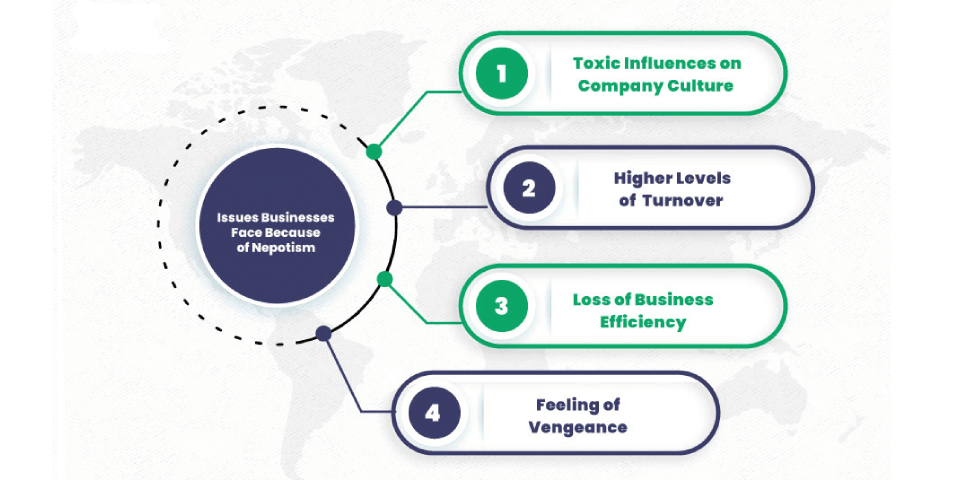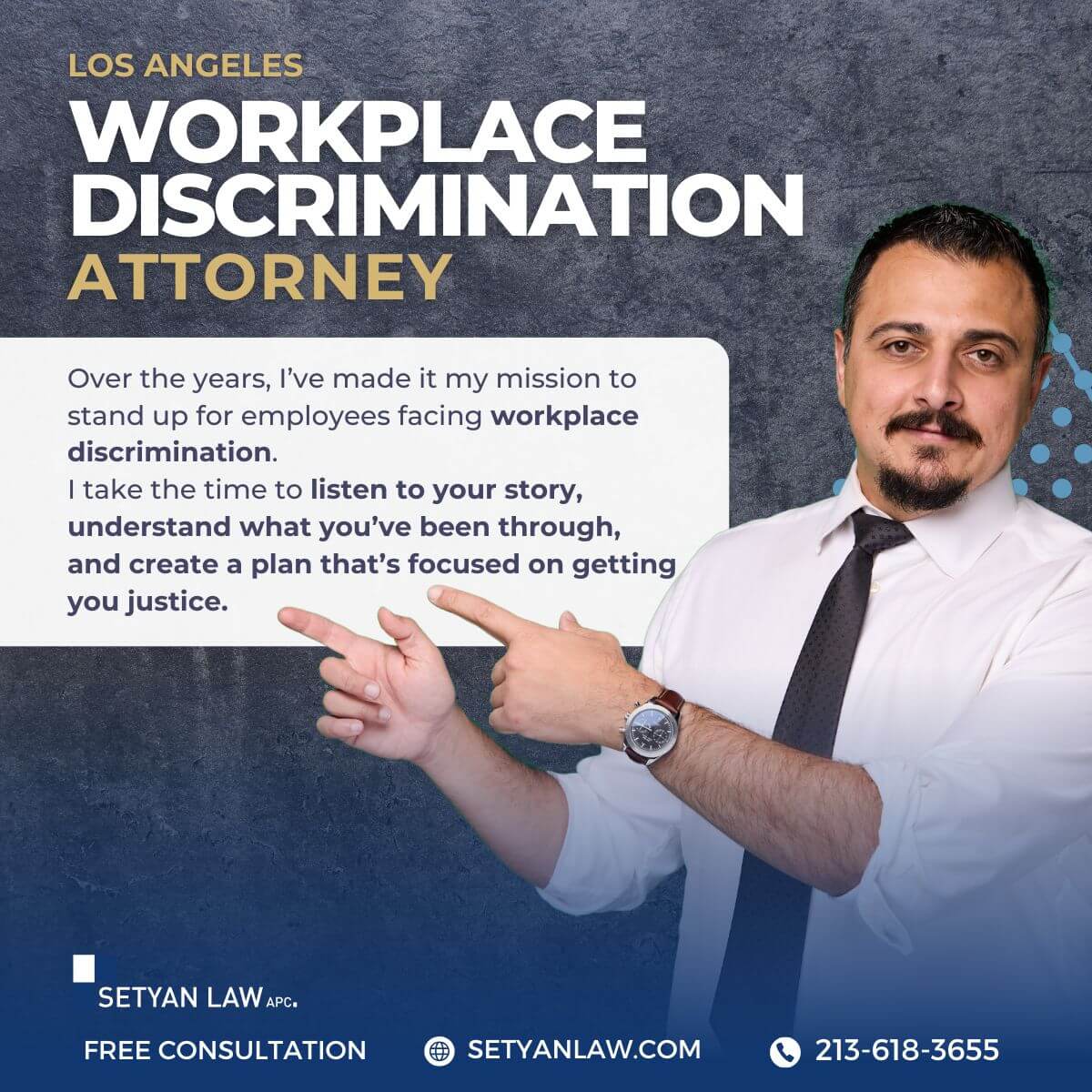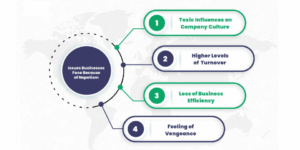Updated October 13, 2025
Is Work Nepotism Against the Law? California's Legal Boundaries Explained
Is nepotism against the law? While many employees assume that hiring family members is illegal across all workplaces, the legal reality in California is more nuanced. Nepotism—the practice of favoring relatives or friends in employment decisions—occupies a complex legal position that varies significantly between public and private sectors.
Although California has no broad prohibition against nepotism in private companies, certain nepotistic practices can cross into illegal territory when they create discriminatory outcomes. In contrast, public sector organizations face strict constitutional and regulatory limitations on family-based hiring and promotion decisions. The distinction lies primarily in whether the favoritism creates a discriminatory impact against protected groups or violates merit-based hiring principles.
This article examines California's approach to workplace nepotism, identifying where family favoritism remains legally permissible and when it constitutes actionable discrimination. We'll explore the specific laws governing both private and government employers, outline how nepotism can lead to valid discrimination claims, and provide guidance on the proper channels for addressing potentially illegal nepotistic practices in your workplace.
Understanding Nepotism in the California Workplace
Nepotism involves more than simply hiring family members—it represents a specific pattern of workplace favoritism with clear definitions and impacts under California law. Understanding these elements helps both employers and employees recognize when preferential treatment crosses legal boundaries.
Definition of Nepotism Under California Law
California regulations define nepotism as "an employee's use of influence or power to hire, transfer, or promote an applicant or employee because of a personal relationship" . This definition appears consistently throughout state regulations, particularly in contexts governing public employment. Furthermore, state workplace policies specifically identify nepotism as "antithetical to California's merit-based civil service system" .
The California Code of Regulations expressly prohibits nepotism in state workplaces because it undermines the fundamental principle that government employment should be based on qualifications and merit rather than personal connections . Essentially, nepotism occurs whenever decision-makers prioritize personal relationships over objective qualifications in making employment decisions.
Types of Relationships That Qualify as Nepotism
California law recognizes several categories of personal relationships that fall under nepotistic practices. Specifically, these include relationships formed through:
- Blood relations (family members)
- Adoption
- Current or former marriages
- Domestic partnerships
- Cohabitation (living together in a romantic relationship)
Some county regulations expand this definition further. For instance, Los Angeles County's policy defines relatives more broadly to include:
- Spouses, ex-spouses, and domestic partners
- Children (including stepchildren, adopted children, and foster children)
- Parents and siblings (including step and adoptive variations)
- Extended family members such as grandparents, in-laws, aunts, uncles, and cousins
Moreover, many workplace policies acknowledge that nepotism can extend beyond family connections to include close friendships and other personal relationships that might influence employment decisions .
Common Workplace Impacts of Nepotism
Nepotistic practices typically lead to several negative consequences in the workplace. First and foremost, nepotism undermines employee morale when workers perceive that advancement depends more on relationships than on performance or qualifications . Additionally, productivity often declines as employees become less motivated to perform well when they believe the path to promotion is compromised by favoritism .
Nepotism also frequently results in:
- Increased employee turnover
- Decreased loyalty to the company
- Diminished quality of work
- Poor management decisions
In state government contexts, nepotism poses additional concerns by potentially undermining public trust that government operations remain free from corruption . Consequently, when appointments stem from personal relationships rather than qualifications, government work becomes less efficient and effective.
From a practical perspective, nepotism often manifests through specific unfair employment practices, including biased promotions, unequal pay raises, exclusive job opportunities, unfair distribution of benefits, preferential working conditions, skewed performance evaluations, and protection from disciplinary actions .
These impacts explain why many organizations implement anti-nepotism policies, particularly in situations where relatives would work closely together, share the same supervisor, or exist in a direct supervisory relationship .
Legal Status of Nepotism in California's Private Sector
Unlike government agencies, private companies in California face fewer legal restrictions regarding family hiring practices. However, even without direct prohibitions, certain forms of preferential treatment can still expose businesses to legal liability.
No Explicit Ban Under State or Federal Law
Private businesses throughout California operate without specific legal prohibitions against nepotism. Indeed, there are no state or federal laws that explicitly forbid private employers from hiring or promoting family members or friends. This stands in stark contrast to the public sector's strict regulations. Private companies remain free to implement their own policies regarding the employment of relatives, or they may choose to have no formal stance on the matter.
This legal freedom stems from California's at-will employment doctrine, which permits employers to make hiring, firing, and promotion decisions for nearly any reason, provided those reasons don't violate anti-discrimination laws . Despite the absence of anti-nepotism laws for private businesses, many companies nonetheless establish internal policies to prevent conflicts of interest that might arise from familial relationships in the workplace .
When Favoritism Violates Anti-Discrimination Laws
Though nepotism itself isn't explicitly illegal, preferential treatment based on personal relationships can cross into unlawful territory under specific circumstances. The pivotal distinction occurs when favoritism creates patterns that effectively discriminate against protected groups.
Nepotistic practices become legally problematic in these situations:
- When less qualified relatives receive promotions over more qualified employees from protected classes
- If the practice creates a hostile work environment or toxic workplace culture
- When widespread sexual favoritism occurs, potentially constituting sexual harassment
- If word-of-mouth hiring predominantly favors one demographic group
- When nepotism breaches employment contracts or company policies
Essentially, nepotism transforms from a questionable practice into illegal discrimination whenever it results in disparate treatment based on protected characteristics. Additionally, nepotistic practices might violate corporate governance laws in publicly traded companies, which require disclosure of potential conflicts of interest to stakeholders under the Sarbanes-Oxley Act .
Protected Classes Affected by Nepotistic Practices
Nepotism often disproportionately impacts certain protected groups. National origin discrimination commonly emerges from nepotistic hiring, as decision-makers typically bring in friends and family of similar heritage, creating a workforce that lacks diversity and potentially discriminating against applicants from different backgrounds .
Other protected classes frequently affected include:
- Race: When family-based hiring creates racially homogeneous workplaces
- Religion: Similar to race and national origin, family networks often share religious affiliations
- Sex/gender: Male-dominated networks may perpetuate gender imbalances
- Marital status: Both preferential treatment of spouses and discrimination against married couples can constitute illegal discrimination
Notably, marital status discrimination presents a complex legal area. While favoring employees' spouses may discriminate against unmarried workers, companies must equally avoid discriminating against employees because they happen to be married to each other .
For employees experiencing nepotism, establishing a discrimination claim requires demonstrating that the favoritism directly relates to a protected characteristic rather than merely personal preference. The distinction between unfair treatment and illegal discrimination hinges on whether the practice systematically disadvantages members of protected groups.
Why Nepotism is Prohibited in California's Public Sector
The public sector in California operates under stringent regulations regarding nepotism that stand in sharp contrast to the relative freedom granted to private employers. These restrictions stem from foundational principles in state governance that prioritize merit, fairness, and public trust.
California Constitution Article VII Requirements
Article VII of the California Constitution establishes the fundamental framework that prohibits nepotism in public employment. This constitutional provision explicitly mandates that all civil service appointments shall be made according to a merit-based selection process. The constitutional requirements serve as the bedrock upon which California builds its stance against nepotistic practices in government operations.
The underlying principle of these constitutional provisions is straightforward yet powerful—public employment decisions must be based solely on merit, which encompasses the education, experience, and skills an individual brings to the position. This constitutional foundation aims to ensure that government hiring remains free from corruption and focuses on finding the most qualified individuals to serve the public interest.
Whereas private companies may legally implement family-based hiring, public agencies cannot, as such practices would directly contradict the constitutional mandate for merit-based employment. This stark distinction reflects the heightened expectations placed on government bodies as stewards of public resources and trust.
2 CCR §87: Merit-Based Hiring Mandate
Building upon the constitutional foundation, California Code of Regulations Title 2, Section 87 (2 CCR §87) explicitly codifies the prohibition against nepotism in state employment. The regulation unambiguously states: "Nepotism is expressly prohibited in the state workplace because it is antithetical to California's merit based civil service system" .
This regulation defines nepotism specifically as "an employee's use of influence or power to hire, transfer, or promote an applicant or employee because of a personal relationship" . Furthermore, it clarifies that "personal relationships" include connections formed through:
- Blood relations
- Adoption
- Current or former marriages
- Domestic partnerships
- Cohabitation
Besides establishing definitions, 2 CCR §87 requires all appointing powers to adopt comprehensive anti-nepotism policies. The regulation strictly prohibits state employees from participating in the hiring process for relatives and forbids direct supervision of employees with whom supervisors have personal relationships .
Mandatory Anti-Nepotism Policies in State Agencies
Pursuant to regulatory requirements, California state agencies must implement formal anti-nepotism policies. Although the California Department of Human Resources (CalHR) does not maintain a uniform statewide policy, it provides guidance for departments to develop their own policies .
These mandatory policies must include several key components:
- A clear statement affirming commitment to merit-based hiring and acknowledging nepotism as contrary to the merit system
- Precise definitions of "nepotism" and "personal relationship"
- Explicit prohibition against participating in selection processes involving personal connections
- Ban on direct supervision of relatives or those in personal relationships
- Established procedures for addressing supervisory issues when personal relationships exist
The California State Personnel Board (SPB) oversees compliance with these requirements through routine audits. Interestingly, a 2019 audit found that nine out of 29 departments lacked policies or had incomplete policies, attributing these gaps to "staff turnover, workload issues, and lack of understanding" .
State officials emphasize that these policies aim to protect both the integrity of government operations and employee morale. Nepotism undermines public trust and potentially reduces workplace productivity when appointments appear based on connections rather than qualifications . Accordingly, the prohibition serves both ethical and practical purposes—ensuring government work is performed efficiently while maintaining public confidence in state institutions.
When Nepotism Becomes Illegal Discrimination
While nepotism itself isn't broadly outlawed in California's private sector, certain workplace favoritism practices can transform into illegal discrimination under specific circumstances. Knowing these boundaries helps employees recognize when they have viable legal claims.
Sexual Favoritism and Hostile Work Environment
The California Supreme Court unanimously ruled that widespread sexual favoritism can create a hostile work environment, even for employees not directly propositioned by supervisors . This groundbreaking decision stemmed from the Miller case involving a prison warden who had consensual affairs with multiple subordinates. The Court determined that when sexual favoritism becomes pervasive, it may convey the demeaning message that management views employees as "sexual playthings" . Ultimately, this environment implies that the way for women to advance is through sexual conduct with managers.
Disparate Impact Based on Race or Religion
Nepotistic practices frequently create workplace demographics that mirror the decision-maker's own background. In fact, a Federal Bank of New York study revealed that 71.5% of employers favored referrals of the same race or ethnicity . This pattern potentially violates anti-discrimination laws when it systematically excludes protected groups from employment opportunities. First thing to remember is that seemingly neutral nepotism policies can have an unlawful disparate impact if they disproportionately affect certain racial or religious groups.
Marital Status Discrimination in Promotion Decisions
Under California's Fair Employment and Housing Act (FEHA), marital status is explicitly protected from discrimination . This protection covers all marital states including single, married, divorced, separated, or widowed status . Marital status discrimination occurs whenever employment decisions—like hiring, promotions, or benefits—are based on an employee's relationship status rather than qualifications . For example, consistently assigning overtime to unmarried employees while allowing married workers family time off constitutes illegal discrimination .
Word-of-Mouth Hiring and Lack of Diversity
Word-of-mouth recruitment, a common form of nepotism, can perpetuate workplace homogeneity. Studies show that employee referrals account for up to 45% of non-entry-level placements at some major companies . As a matter of fact, research indicates that 63.5% of employers referred applicants of the same sex . Such patterns create monocultures that not only limit diversity but can violate anti-discrimination laws. Companies heavily relying on referrals should balance this approach with open-market hiring to avoid potential legal exposure.
Filing a Discrimination Claim Based on Nepotism
When nepotistic practices cross into discrimination territory, employees have legal recourse. Pursuing a formal complaint requires navigating specific procedures through government agencies.
Filing with the EEOC: Title VII Protections
To pursue federal discrimination claims, employees must file with the Equal Employment Opportunity Commission (EEOC). The EEOC enforces Title VII protections against discrimination that can arise from nepotistic practices that disadvantage protected groups.
Filing with the CRD Under FEHA
For state-level claims, California's Civil Rights Department (CRD) handles complaints under the Fair Employment and Housing Act (FEHA). FEHA often provides broader protections and applies to smaller employers than federal law. Both agencies maintain a "work sharing agreement," allowing cross-filing between them .
Deadlines: 180 Days vs 3 Years
Time constraints differ dramatically between federal and state options. EEOC charges must be filed within 180 days of the discriminatory act, or 300 days in California . Meanwhile, CRD complaints allow a considerably longer window of three years from the date of discrimination .
Right-to-Sue Letters and Lawsuit Process
After filing, both agencies may investigate your claim. Eventually, they will issue a "right-to-sue" letter permitting you to file a lawsuit. Following an EEOC letter, you have just 90 days to file in federal court . CRD letters provide a full year to initiate state court proceedings .
Internal HR Reporting as a First Step
Before pursuing agency claims, addressing concerns with your employer's human resources department is advisable. This step establishes a record of your complaint and might resolve the issue without further legal action .
Conclusion
Understanding nepotism's legal boundaries throughout California workplaces requires recognizing the fundamental distinction between public and private employment contexts. Essentially, while government agencies must adhere to constitutional merit-based hiring requirements, private companies maintain significant latitude in employing relatives or friends. Nevertheless, this freedom isn't absolute.
Private sector nepotism crosses into illegality whenever it creates discriminatory outcomes affecting protected classes. Sexual favoritism, disparate racial impact, marital status discrimination, and word-of-mouth hiring practices that limit diversity all represent scenarios where seemingly innocent family preferences become actionable discrimination claims. Employees facing such discrimination have legal recourse through both federal EEOC protections and California's more expansive FEHA regulations.
Public agencies, conversely, operate under strict constitutional and regulatory frameworks that explicitly prohibit nepotistic practices regardless of discriminatory intent. These restrictions serve dual purposes—maintaining public trust while ensuring government operations remain based solely on merit and qualifications rather than personal connections.
Regardless of workplace setting, employees should document questionable nepotistic practices, understand relevant reporting deadlines, and consider internal HR channels before pursuing formal agency complaints. Though favoritism may seem merely unfair rather than illegal, certain patterns of preferential treatment create valid legal claims when they systematically disadvantage protected groups.
California law thus establishes clear boundaries—nepotism itself remains legally permissible within private businesses but becomes unlawful discrimination when it creates disparate impacts based on protected characteristics. Meanwhile, public sector nepotism flatly contradicts constitutional merit principles. This nuanced approach balances employer discretion against fundamental workplace fairness, creating meaningful protections without unnecessarily restricting legitimate business practices.
References
[1] – https://corporate.findlaw.com/human-resources/sexual-favoritism-when-an-office-romance-can-result-in-a-hostile.html
[2] – https://www.law.cornell.edu/regulations/california/2-CCR-87
[3] – https://hrmanual.calhr.ca.gov/Home/ManualItem/1/1204
[4] – https://www.advocatemagazine.com/article/2025-june/comparing-title-vii-discrimination-claims-and-feha-claims
[5] – https://www.shouselaw.com/ca/blog/california-labor-laws-nepotism/
[6] – https://www.garciagurney.com/blog/nepotism-mixing-family-and-work/
[7] – https://d.law/is-nepotism-legal-in-the-workplace/
[8] – https://uk.practicallaw.thomsonreuters.com/6-562-1685?transitionType=Default&contextData=(sc.Default)
[9] – https://waltmanemploymentlaw.com/sue-for-nepotism/
[10] – https://www.stevenrubinlaw.com/is-favoritism-discrimination/
[11] – https://thelawdictionary.org/article/nepotism-cronyism-favoritism-illegal/
[12] – https://setyanlaw.com/understanding-protected-classes-california-employment-law/
[13] – https://hrmanual.calhr.ca.gov/ManualItem/HistoricalView/1/11?date=02%2F06%2F2018%2006%3A22%3A49
[14] – https://www.sacbee.com/news/politics-government/the-state-worker/article247870500.html
[15] – https://www.recruiter.com/recruiting/does-word-of-mouth-hiring-harm-diversity/
[16] – https://cdvlawfirm.com/marital-status-discrimination-in-california/
[17] – https://haelaw.com/how-long-do-i-have-to-file-a-discrimination-claim-in-california/
[18] – https://feherlawfirm.com/right-to-sue-letter/
Why Choose Setyan Law, APC?
Consulting a workplace discrimination attorney will provide you with the necessary guidance and support to navigate the legal process effectively. Remember, time is of the essence, so seek legal advice promptly to maximize your chances of a successful outcome.
Call Setyan Law at (213)-618-3655 for a consultation.






